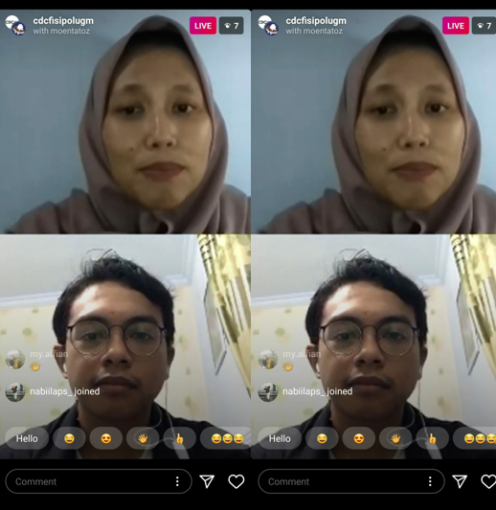
Yogyakarta, May 18th 2020—Career Development Center or CDC of Fisipol UGM is back again with a career education live stream session. This session is filled by Reni Apriliawati, M.Psi, one of CDC’s psychologist. This talk raised the topic of psycho test. Guided by Dimas Wahyudi, an internship officer as well as CDC’s social media admin, the live stream session started at 4 pm.
The topic about psycho test was raised out of Dimas’s curiosity about the reason someone is accepted or rejected based on their psycho test. Reni explained that psycho test is meant to uncover whether a potential employee’s qualities match the need of the company. Through psycho tests, companies will try to find the employee that match the most, not necessarily someone who have a higher score on the test.
Talking about matches, Reni explained that there are two type of match that companies are looking for. The first match is a person job-fit match, which is a match between the qualification of the potential employee with the company’s needs. The second type of match is a person organization-fit match, which is a match between potential employee with the culture and values that the company is upholding because those values can affect the job performance when the potential employee is working. Reni explained that psych test are essentially a standard procedure to take behavioral sample and to elaborate it in the form of score.
In a psych test, there are a couple competency that are analyzed which are the intellectual aspect, work ethics (consists of fastness, precision, endurance, and discipline), and behavior (consist of communication and team work). Back to the primary goal of this psych test, the result of each competence is taken according to what the organization or company currently needs. If someone does not succeed, it does not mean that they are a failure, it may mean that they over-qualify. Reni also explained that the selection process varies, according to each organization and company.
In dealing with psych tests, someone should only try to be the best version of themselves. The potential employee does not have to “learn for a psych test”, because what is being looked for in a psych test is a connection or a match. What needs to be paid attention to when doing psych test is not how to do it, but how to bring out our best self to answer those questions.
When someone train or study with methods with a questionable validity, it will only lead them to negative results. They may lose their focus and not give a maximal result. Even if that person eventually gets the job, in the long term it will not be good because fundamentally there is no person-company match.
Reni then gave some tips and trick in conducting the psych test, both for the short term and the long term. The short term includes methods that can be done when doing the psych test. The first tips are to have enough rest and breakfast so that the participant can concentrate on the task at hand. Other than that, the participant also needs to arrive on time. Not only will it be noted by the tester, arriving on time will also help reduce participant’s anxiety and doubt. When doing the psych test, the participant needs to be confident in their own competence, as well as being mindful and focused on what participants are currently working on instead of being mindful of other people’s works.
For the long term tips, Reni suggest that participants try to develop themselves in the aspects of work ethic, responsibility, and behavior. The fundamentals of developing ourselves are knowing ourselves. When someone already knows who they are, only then will they be able to develop themselves.
The live session is in a form of dialogue between Dimas and Reni, where Dimas read the questions that viewers give in CDC’s Instagram DM or through the livestream comment section. The livestream ended on 5 pm with a conclusion given by Dimas and Reni.
